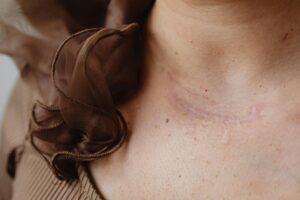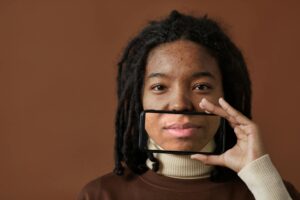Many people turn to birth control when traditional acne treatments don’t seem to work. Hormonal breakouts can be frustrating, especially when they appear like clockwork before your period or along the jawline and chin.
Birth control can help balance hormones and reduce acne for some people, but it is not the right choice for everyone. Understanding how it works, its possible risks, and what other options exist will help you make an informed decision about your skin and health.
How Birth Control Works for Acne
Hormones play a big role in acne. Androgens, a group of hormones that includes testosterone, increase oil production in the skin. Too much oil can clog pores, leading to inflammation and breakouts.
Birth control pills that contain estrogen and progestin can help by lowering androgen levels. Less androgen means less oil production, fewer clogged pores, and smoother skin.
However, the effects take time. It usually takes about 2 to 3 months of consistent use before noticeable improvement appears.
Best Types of Birth Control for Acne
Not all birth control options help with acne. Only combined oral contraceptives (COCs) — those containing both estrogen and progestin — have been shown to improve acne.
Three brands are FDA-approved for acne treatment:
-
Ortho Tri-Cyclen (ethinyl estradiol + norgestimate)
-
Yaz (ethinyl estradiol + drospirenone)
-
Estrostep Fe (ethinyl estradiol + norethindrone acetate)
These pills help stabilize hormone levels and reduce sebum production.
On the other hand, progestin-only pills (also called mini-pills) can worsen acne, since some types of progestin act like androgens in the body, increasing oil production instead of lowering it.
Who Can Benefit Most
Birth control can be helpful for:
-
People whose acne flares up before their period.
-
Adults with persistent jawline or chin breakouts.
-
Those with hormonal imbalances such as PCOS.
-
Women who experience excess oil and inflammation not controlled by topical treatments.
Birth control is often recommended for people who don’t respond to antibiotics or can’t tolerate stronger medications like isotretinoin.
How Long It Takes to See Results
Improvement usually appears after two to three months of continuous use.
During the first few weeks, acne can sometimes worsen slightly before improving — this happens as hormone levels begin to stabilize.
Consistency matters. Skipping doses or switching brands frequently can disrupt hormone balance and delay results.
The Pros of Using Birth Control for Acne
-
Regulates hormones: helps reduce oil and hormonal flare-ups.
-
Improves period-related acne: balances monthly hormone changes.
-
Dual benefit: prevents pregnancy while improving skin.
-
May reduce menstrual pain and regulate cycles.
-
Can be combined with other acne treatments like retinoids or benzoyl peroxide for better long-term control.
The Cons and Possible Risks
Birth control pills are medications that affect the entire body, not just the skin. While most side effects are mild, some risks are serious and need to be considered carefully.
Common Side Effects
-
Nausea or mild stomach upset.
-
Breast tenderness.
-
Spotting between periods.
-
Mood swings or decreased libido.
-
Temporary weight fluctuations.
Serious Risks (less common)
-
Blood clots — especially in smokers or women over 35.
-
Stroke or high blood pressure in at-risk patients.
-
Migraines or worsening headaches.
-
Liver complications in rare cases.
Skin-Related Risks
-
Progestin-heavy pills may make acne worse.
-
Some users develop melasma (dark facial patches) when exposed to sunlight. Daily sunscreen is essential.
While the risk of severe side effects is low, anyone with a history of blood clots, migraines with aura, or hypertension should avoid hormonal contraceptives unless cleared by a doctor.
When Birth Control Might Not Be the Right Choice
Birth control may not be suitable for:
-
Smokers over age 35.
-
People with liver disease or history of clotting disorders.
-
Those prone to mood changes or migraines.
-
Anyone who prefers to avoid hormones or wants a natural treatment path.
It’s also worth noting that stopping birth control can cause temporary rebound acne, as hormone levels shift back to their natural cycle. This is normal and usually improves within a few months.
Alternatives to Birth Control for Acne
If you prefer not to use hormonal treatment, there are several effective non-hormonal options.
1. Topical Treatments
-
Retinoids (tretinoin, adapalene, tazarotene): speed up skin turnover, prevent clogged pores, and smooth texture.
-
Benzoyl peroxide: reduces bacteria and inflammation.
-
Azelaic acid: calms redness and helps fade acne marks.
2. Prescription Medications
-
Spironolactone: blocks androgen activity, reducing hormonal oil production without being a contraceptive.
-
Oral antibiotics: short-term use for inflamed acne (3–6 months max).
-
Isotretinoin (Accutane): the strongest option for severe cystic acne when other treatments fail.
3. Lifestyle and Skincare
-
Stick to gentle, oil-free, and non-comedogenic products.
-
Manage stress levels, since cortisol can trigger hormonal flare-ups.
-
Limit high-glycemic foods and excess dairy, both linked to increased sebum production.
-
Keep consistent sleep patterns and hydration — both influence hormone balance.
Skincare Routine for Hormonal Acne
Morning
-
Cleanse with a mild, pH-balanced cleanser.
-
Apply a lightweight, non-comedogenic moisturizer.
-
Use broad-spectrum SPF 30+ daily.
Evening
-
Remove makeup and oil buildup.
-
Apply a retinoid or azelaic acid treatment.
-
Follow with a calming, oil-free moisturizer.
Keeping the skin barrier healthy while treating acne helps prevent dryness, sensitivity, and rebound breakouts.
FAQs About Birth Control and Acne
Can birth control completely cure acne?
No. It can reduce acne caused by hormonal fluctuations, but maintenance treatments like retinoids or azelaic acid are often still needed.
Can birth control cause acne instead of fixing it?
Yes. Some progestin-only pills can increase androgen activity, which may worsen breakouts.
How long should I stay on birth control for acne?
Many people stay on it for several months or years, depending on skin response and overall health. Always check in regularly with your doctor.
What happens when I stop taking birth control?
Some people experience temporary hormonal acne after discontinuing, but it usually improves as hormones stabilize.
Can I combine birth control with other acne treatments?
Yes. Dermatologists often combine birth control with retinoids, spironolactone, or topical treatments for long-term results.
Is it safe to take birth control only for acne?
Yes, if you are medically cleared to use it. Many people take combined contraceptives primarily for acne management.





